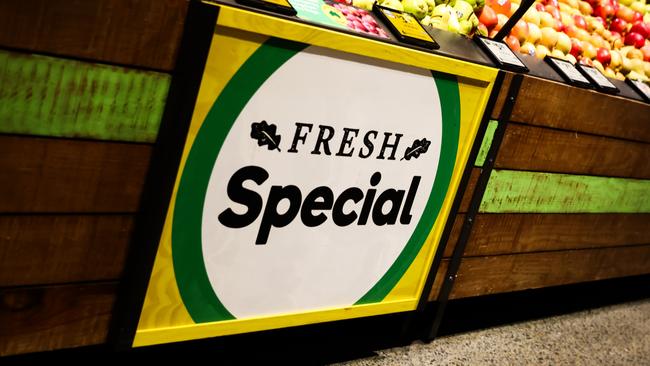Land banking restrictions an easy supermarket reform: analysts
Analysts say steps to avoid land banking by supermarket giants Woolworths and Coles are a quick competitive reform, but other measures may crunch profits and hurt shoppers.

Placing restrictions such as time limits on Woolworths and Coles over their purchase of properties to develop into new stores is an easy reform that could kill off the strategy of land banking and improve competition in the $135bn supermarket sector, analysts say.
Other crucial reforms to bring greater transparency around supply chains and pricing that have been suggested include benchmarking for producers of perishable foods, such as meat, fish, fruit and vegetables, to help guide supply terms and profitability for suppliers.
However, a new report from Jarden analyst Ben Gilbert has warned that further regulation of major supermarket chains Woolworths and Coles could impact profitability and then the ability to reinvest in their supply chains – such as technology and robotic distribution centres – which could have the adverse impact of raising food and grocery prices and worsening the shopping experience for consumers.
“There’s a lot of focus on Coles and Woolworths because they’re the biggest. But they’re also very efficient. And an efficient market ultimately benefits the consumer,” Mr Gilbert told The Australian.
“If you start putting big restrictions on the most efficient retailers that are spending billions of dollars every year, trying to make their supply chains better, make the shopping experience better for the customers, and you impact their profitability – what’s the flow-on effect for the smaller players in the market.”
In the wake of Tuesday’s appearance at the Senate supermarkets inquiry by Woolworths boss Brad Banducci and Coles boss Leah Weckert, combined with an ongoing inquiry by the competition regulator as well as a review of the food and grocery code of conduct, Mr Gilbert has raised the regulatory risks and possible reforms that could be imposed on the industry.
The political heat around Woolworths and Coles has ratcheted up markedly in recent months, and hit fever pitch on Tuesday when Senate inquiry chairman, Greens Senator Nick McKim, threatened Mr Banducci with six months jail for refusing to reveal Woolworths’ return on equity last year.
The Senate inquiry report is due out in early May and combined with the Australian Competition and Consumer Commission review could recommend sweeping reforms to the way Woolworths and Coles operate, from land banking and pricing to the treatment of suppliers and the way the chains promote products on discount.

An issue raised at the Senate inquiry by a number of players has been the strategy of land banking, where Woolworths and Coles allegedly buy up land and properties to then sit on them for years to keep out competitors from establishing stores in a particular neighbourhood that compete with their existing stores. Mr Gilbert said this might be the easiest reform to introduce.
“If we look at the key debates from the inquiries and what’s being talked about, the ones that are more immediate and probably easier to implement, would be things like land banking,” he said.
“And a big point of discussion has been the competitive backdrop, and how easy or difficult it is to enter or establish a presence in the Australian market. And a lot of that surrounds the ability to secure sites.”
Ms Weckert told the Senate inquiry that Coles was sitting on about 30 sites that it was preparing to develop into stores, although she strongly rejected the accusation the chain was scooping up sites or dragging its feet on developing them to strangle competition.
“One thing that got some attention was Coles’ stating they have around 30 sites on their balance sheet today, to be developed in time, with questions as to whether they taking up sites and using balance sheet that could preclude others from gaining entry,” Mr Gilbert said.
“So what we could see is some potential laws or legislation around how long you’re allowed to hold land for the purpose of developing it into a store. So if you acquire a site, do you then have to provide a commitment that will be developed in a reasonable space of time?
“Is that two or three years? I don’t know because there’s a lot of other things that could happen, you can have planning delays etc. That is a reasonably easy one that could be implemented. That would go to the core of some of the issues being debated.”
Around the issue of misuse of market power and paying suppliers a fair or reasonable price for their produce, Mr Gilbert said a benchmarking of supplier costs within the agricultural sector could help guide trade terms and prices – but this came with a huge set of complexities.
“Do we need more transparency through the supply chain and around cost structures? Pricing and terms? Do we need some benchmarking? The key there would be not to disadvantage the retailers by allowing people (farmers) to be unproductive.
“So you’d obviously need to have an industry benchmark, now that could be something that has an enormous amount of complexity that goes with this. How do you benchmark a producer of chicken versus someone who grows lemon or a squash.”
The Senate inquiry into the supermarkets will issue its final report on May 7.






To join the conversation, please log in. Don't have an account? Register
Join the conversation, you are commenting as Logout